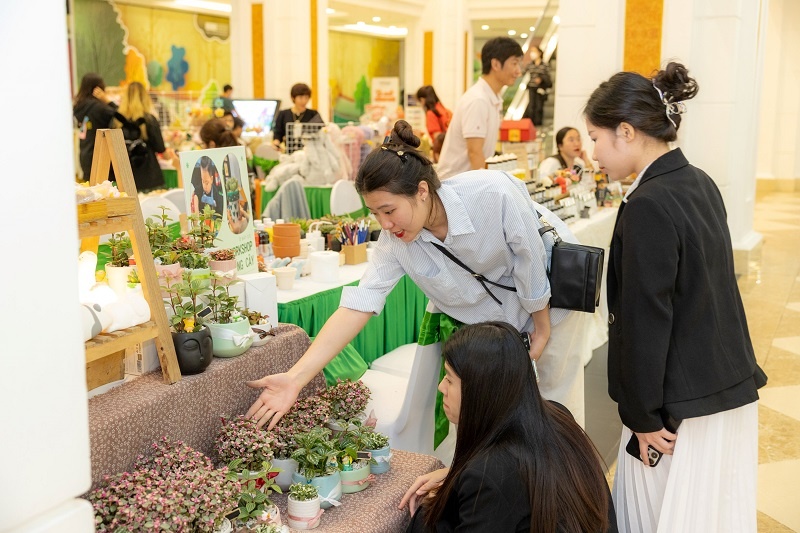Vietnamese consumers careful amid economic volatility
Consumers are prioritising healthier and more conscious lifestyles, and this shift is reflected in spending patterns. Non-essential categories such as luxury items, entertainment products (like books and movies), and toys are seeing reductions in consumer spending, while essentials like groceries, clothing, and healthcare are expected to see increases, according to the Asia-Pacific Voice of the Consumer Survey 2024 - Vietnam Highlights, released by PwC on November 11.
In Vietnam, 63 per cent of consumers plan to increase their spending on groceries in the next 12 months, followed by clothing (52 per cent) and healthcare products (48 per cent).
 |
The survey, which covered over 7,000 consumers across the Asia-Pacific region, including 515 from Vietnam, also highlighted inflation as the leading concern for the majority (63 per cent) of Vietnamese consumers over the coming year. As a result, shoppers are placing higher value on reassurance and reliability from the brands they engage with, making it imperative for consumer-facing companies to focus on building multi-dimensional trust and fostering meaningful connections with a newly empowered, diverse consumer base.
“Consumers today face multiple challenges, including economic uncertainty, data privacy concerns, and an increased
awareness of environmental and social issues,” said Rakesh Mani, consumer markets leader at PwC Asia Pacific. “Companies that succeed will prioritise building deeper trust with their consumers. That emotional resonance—whether through product innovation, omnichannel convenience, or sustainability initiatives—elevates interactions beyond mere transactions and fosters deeper loyalty.”
 |
| Vietnamese consumers become more mindful of how they spend amid economic volatility. Photo: baodautu.vn |
To meet evolving expectations, brands and retailers are encouraged to adopt flexible omnichannel strategies that deliver a seamless mix of online and offline experiences. Vietnam leads the region in online shopping, with 67 per cent of consumers purchasing via mobile phones and 44 per cent via PCs, while in-store shopping remains robust, attracting 63 per cent of shoppers.
Vietnamese consumers are also actively using social media to discover new brands and read reviews before purchasing. Seventy-one per cent report having purchased products directly through social platforms–significantly higher than the regional average of 56 per cent. However, consumer trust in social media appears to be waning, with concerns about safety and reliability rising. About 77 per cent are worried about data privacy and data-sharing practices, on par with the Asia-Pacific average of 74 per cent.
Sustainability is increasingly becoming a priority for Vietnamese consumers, with 94 per cent reporting experiencing the disruptive effects of climate change in their daily lives–compared to the regional figure of 88 per cent. Notably, 74 per cent of Vietnamese consumers are willing to pay up to 20 per cent more for products made from recycled or sustainable materials, and 85 per cent would consider buying a hybrid or electric vehicle within the next three years.
The survey also found that more than half of Vietnamese respondents are comfortable using AI for low-risk tasks, although they still prefer human interaction for more complex matters. Sixty-nine per cent trust AI to assist in gathering product information, followed by providing product recommendations (63 per cent) and handling customer service inquiries (59 per cent).
These global megatrends—including technological disruption and the shift towards sustainability—may seem distant or abstract but present concrete opportunities for consumer-facing companies to innovate for sustainable growth in Vietnam.
Nguyen Luong Hien, consumer lead partner at PwC Vietnam, emphasised the importance of building consumer trust in today’s evolving market. “As business leaders in Vietnam navigate the shifting consumer landscape, it is crucial for them to take decisive steps to drive growth,” he said. “The Voice of the Consumer Survey 2024 report underscores the need to build trust with consumers and offers strategies to address their immediate needs.”
The report highlights the importance of delivering value beyond pricing, tailoring strategies based on specific consumer needs, and supporting ethical choices. Transparency and consistency are key to cultivating trust, while a well-structured Generative AI (GenAI) strategy with robust risk management can engage consumers effectively and build trust early on. Genuine sustainability practices, supported by transparency and third-party certifications, are also essential for long-term success.
“By focusing on these actions, business leaders can adapt to current challenges, accelerate growth, and thrive in Vietnam's evolving consumer market, which is projected to become one of the world’s largest by 2030,” Hien added.
 | Vietnamese consumer sentiment weighs regional averages Vietnamese consumers are sharing positive sentiments about their country's current and future economic environment, which are higher than the regional average, according to the ASEAN Consumer Sentiment Study – Vietnam report released by UOB on November 7. |
 | Visa report shows top scams impacting consumers and businesses globally Visa released the spring 2024 edition of its Biannual Threats Report on July 24, outlining the top payment threats to consumers and businesses around the world. |
 | Consumers and dealers concerned about the future of EVs On July 31, KPMG in Vietnam, in collaboration with EuroCham and Cho Tot Xe, held an event for the launch of the report "Driven by Voltage: Navigating the electric vehicle landscape." |
What the stars mean:
★ Poor ★ ★ Promising ★★★ Good ★★★★ Very good ★★★★★ Exceptional
Related Contents
Latest News
More News
- Masan Consumer names new deputy CEO to drive foods and beverages growth (February 23, 2026 | 20:52)
- Myriad risks ahead, but ones Vietnam can confront (February 20, 2026 | 15:02)
- Vietnam making the leap into AI and semiconductors (February 20, 2026 | 09:37)
- Funding must be activated for semiconductor success (February 20, 2026 | 09:20)
- Resilience as new benchmark for smarter infrastructure (February 19, 2026 | 20:35)
- A golden time to shine within ASEAN (February 19, 2026 | 20:22)
- Vietnam’s pivotal year for advancing sustainability (February 19, 2026 | 08:44)
- Strengthening the core role of industry and trade (February 19, 2026 | 08:35)
- Future orientations for healthcare improvements (February 19, 2026 | 08:29)
- Infrastructure orientations suitable for a new chapter (February 19, 2026 | 08:15)

 Tag:
Tag:



















 Mobile Version
Mobile Version